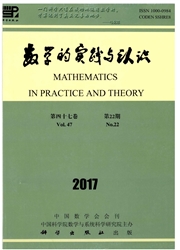

 中文摘要:
中文摘要:
由于碳排放数据存在着计算上的困难,低碳政策实施面临着"可测量、可计算、可核实"问题,需要政府设计合适的节能减排政策激励机制.考虑追求社会福利最大化的政府,建立了政府企业节能减排政策的委托代理模型,在激励相容约束下促进高能耗企业积极节能减排.最后,通过选取我国汽车行业节能减排政策的算例,分析了政府推出小排量汽车的购车优惠补贴和下调车辆购置税等激励性政策,以及取消优惠购车政策补贴、出台"车市限购令"和"单双号出行"等限制性政策,对于生产商(以及消费者)选择不同排量汽车产销量的影响.
 英文摘要:
英文摘要:
Because of difficulty to calculation of Carbon emission, the puzzles of "measurability, calculability, verifiability" are the key in the low-carbon policy implementation so government needs to design favorable incentive mechanism. Considering the government pursues the maximal social welfare, the paper builds the principal-agent model for promoting the energy saving and emission reduction, under the constraint of incentive compatibility. Lastly, the paper chooses the policy of energy saving and emission reduction in Chinese auto indus- try as the calculation case. When government implements subsidies for car buyers and other tax incentives, and then cancels the subsidies, takes some restrictive policies including car purchase restriction and matching their license plates to the date on an odd-or-even system, those low-carbon policies have the obviously effect on the manufacture or consumer's decision making.
 同期刊论文项目
同期刊论文项目
 同项目期刊论文
同项目期刊论文
 Bifurcation and positive solutions of a nonlinear fourth-order dynamic boundary value problem on tim
Bifurcation and positive solutions of a nonlinear fourth-order dynamic boundary value problem on tim Bifurcation from interval and positive solutions of a nonlinear second - order dynamic boundary valu
Bifurcation from interval and positive solutions of a nonlinear second - order dynamic boundary valu 期刊信息
期刊信息
